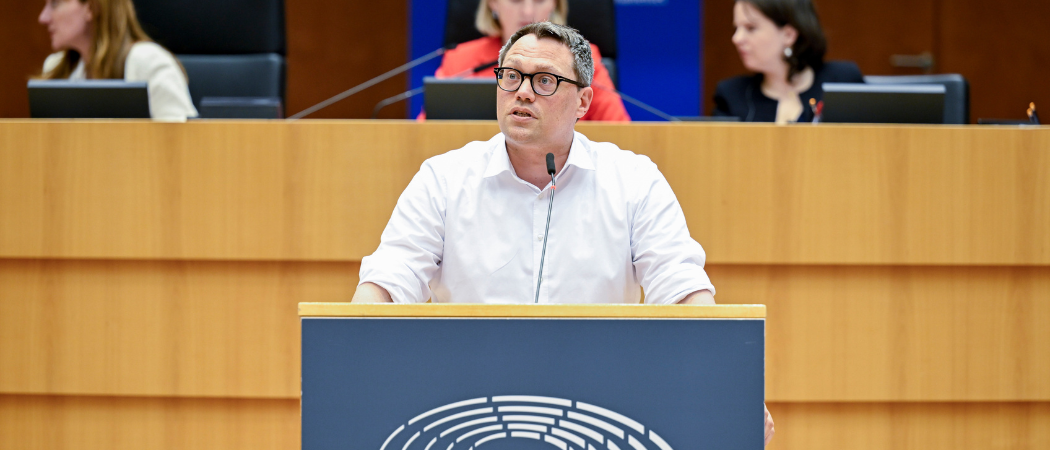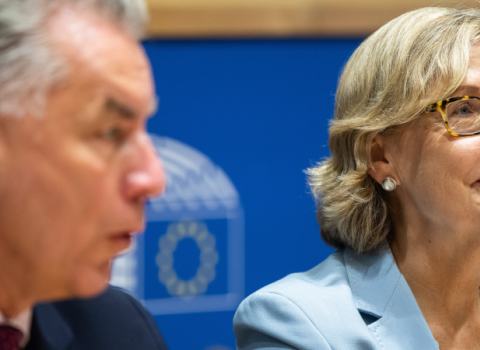MEPs voted to adopt their negotiating position on the controversial reform, but it will not be finalised until after the European elections in June. Despite concessions, the pharma industry is not happy

Tiemo Wölken, rapporteur for the regulation. Photo credit: Emilie Gomez / European Union
MEPs adopted their position on the reform to EU pharmaceutical legislation in plenary on Wednesday, setting the stage for negotiations with member states, with Parliament confirming the file will be finalised after the European elections in June.
“Today’s vote is a step towards delivering the tools to tackle present and future healthcare challenges, particularly for our market attractiveness and access to medicine across EU countries,” said Pernille Weiss, rapporteur for the file alongside Tiemo Wölken.
The proposal, which represents the most significant reform to pharma legislation in over two decades, has proved controversial, with MEPs divided over how best to achieve the stated aims of improving patient access whilst encouraging innovation.
The Commission wanted to reduce the baseline regulatory data protection, during which other companies cannot access clinical trial data submitted to the European Medicines Agency to get marketing approval, from eight to six years, plus two years of market protection during which generic or biosimilar products cannot be sold.
The original proposal included potential extensions, including an additional two years of data protection if the company launches the drug in all member states. The pharma industry warned against this, saying companies have no control over the timing of separate national pricing and reimbursement decisions and the vast majority of delays in access occur when a company is involved in these negotiations.
In the event, MEPs turned the proposal around, putting the onus on member states to request companies to submit pricing and reimbursement applications.
MEPs also sought a compromise on access to clinical trial data, settling on seven and a half years of regulatory data protection, plus two years of market protection.
Companies would be eligible for extensions if a product addresses an unmet medical need, if they conduct comparative clinical trials, and if a significant share of the product’s R&D takes place in the EU and in collaboration with EU research entities. There would be an upper cap of eight and a half years of regulatory data protection.
They are also proposing a 12-month extension to market protection if the company obtains marketing authorisation for an additional therapeutic indication which provides significant clinical benefits in comparison with existing therapies.
Orphan drugs for treating rare diseases would get up to 11 years of market exclusivity if they address a “high unmet medical need”.
Reducing incentives
Pharma industry group EFPIA welcomed the “common sense step” of not making the regulatory data protection period conditional on launching in all member states, but warned the six-month reduction compared to the existing regulation would have a harmful effect.
“It is difficult to understand how reducing incentives to research, develop and manufacture new medicines and vaccines could ever be in the best interest of Europe or European patients, particularly at a time when Europe recognises that it needs to boost competitiveness to compete for global investment with ambitious nations like the US and China,” said EFPIA director general Nathalie Moll.
Stefan Woxström, senior vice president of AstraZeneca for Europe and Canada, urged legislators to carefully evaluate the potential impact of their revisions.
“While the Parliament vote advocates for promising reforms to the Commission’s proposals, it is regrettable to see the endorsement to reduce the baseline regulatory data protection for innovative medicines and market protection to develop orphan medicinal products,” he said.
Europabio, which represents innovative biotech companies that take on academic research and translate it into drug programmes that are suitable for onward development by pharma companies, isn’t happy either. While acknowledging some improvements, it said the proposals are not positive for Europe’s biotech ecosystem, and “Most likely will lead to decreased investment potential for European innovation and reduced innovation maturation through collaboration and partnership.”
To boost research and development of novel antimicrobials and tackle the problem of antimicrobial resistance, MEPs want to introduce financial support based on meeting milestones prior to market approval.
MEPs also added a voluntary joint procurement scheme for antimicrobials, under which governments would pay a fixed subscription and companies would be guaranteed a fixed annual payment. The intention is to delink the volume of sales from the commercial return, to limit use of new antimicrobial drugs, in order to slow the development of resistance.
The vote is the fruit of a hard-won compromise between Parliament’s main groups, the EPP and S&D, which began the process at opposite ends of the debate.





 A unique international forum for public research organisations and companies to connect their external engagement with strategic interests around their R&D system.
A unique international forum for public research organisations and companies to connect their external engagement with strategic interests around their R&D system.